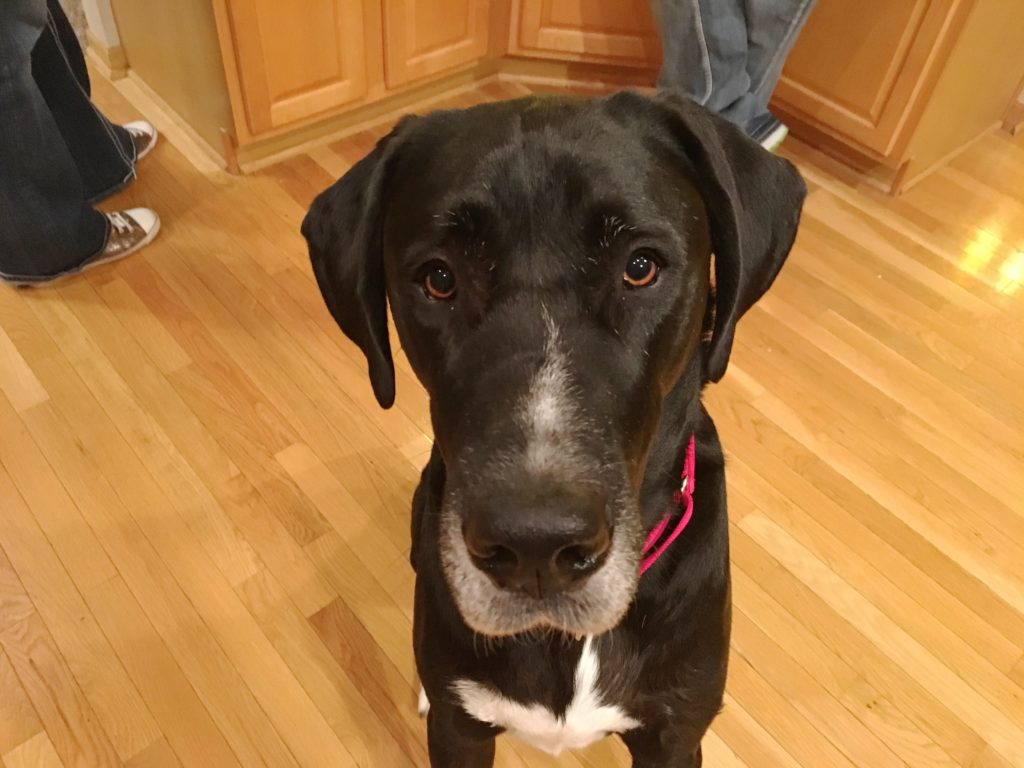Teaching a Great Dane Control to Stop Him From Attacking the TV
By: David Codr
Published Date: November 13, 2016
Zeus is a three-year-old Black Lab / Great Dane mix who lives in Omaha, Nebraska. His guardians set up a dog behavior session with me to stop him from getting over excited, charging the door and stop acting aggressively to dogs or animals he sees on TV.
Zeus was front and center as soon as his guardian opened the door. This is OK for some dogs but if you have one that is reactive, opening the door while the dog is in front of you can often exasperate the situation. Being so close makes things more intense for the dog which can reduce their ability to control themselves.
I also noticed the guardian did something that may actually cause Zeus to push forward even more.
Dogs have something that is called an Opposition Reflex. This causes them to pull or push against any pressure applied from the opposite direction. This is why a dog almost always pulls on the leash anytime you try to pull them in a different direction. A version of this kicks in when we try to push our dogs away.
A better strategy would be to utilize the escalating consequences that I introduced later in the session to move the dog away from the door before actually opening it. By standing up tall, turning to face the dog with the door at the human’s back, then marching at the dog until it is a reasonable distance away from the door, we can help it understand that we have the situation under control and we want them to keep a respectable distance.
I sat down with Zeus and his guardians to discuss the situation and how I could best help. We started off by going over rules and structure. I have found that frequently dogs with behavioral problems do not have a lot of rules or structure in their lives. Zeus was one of these dogs.
This lack of structure can very easily lead the dog into believing that it has the same authority as the humans it lives with. When a dog considers itself to have the same authority as the humans, then listening to the humans commands and corrections becomes optional.
While Zeus was generally well behaved, he ignored his guardians any time he saw an animal on TV as he was reacting so strongly, he literally couldn’t control himself.
After suggesting a number of rules and going over ways that the guardians can enforce them, I had the guardians play back a television episode that featured animals so that I could see how Zeus reacted.
A quick note on the above video. I only got close to Zeus because I had observed this behavior before and knew that it was directed exclusively towards the television. If you have a dog that is reacting this way and you are not certain of the dog’s intentions, do not approach or attempt to correct the dog when displaying this sort of outburst. If necessary, arrange for the services of an experienced dog behaviorist or dog trainer who uses positive reinforcement.
Once we turned the TV off and Zeus settled down, I pulled out some high-value treats and spent a couple of minutes going over a counter conditioning exercise that the guardians can use to help Zeus stop seeing animals on TV as something he needs to attack.
The idea is to move the dog away from the TV and have it on a leash to keep it from moving around. One guardian pulls out a high value treat and lets the dog start eating it. Only after it starts eating it, we turn the TV on or pull up video with an animal on it. Over time, this causes the dog to associate the treats as being connected to the animals on TV. Because the treat is a positive reinforcer, the dog eventually sees animals on TV as the cause of the dog getting the tasty treats.
It will be important for the guardians to practice this counter conditioning exercise (with the dog far away from the TV) often until Zeus no longer stares, breathes heavily, gets tense or shows any other signs of anxiety, fear or aggression when animals appear on the television. Once he can watch animals at that distance, the guardians can repeat the exercise but move Zeus progressively closer to the TV. Eventually they should be able to get him to see animals on TV without reacting at all.
I also wanted to give the guardians the ability to redirect their dog’s attention on command. One of my favorite ways to do this is to teach the dog to respond to a Focus command. Teaching a dog to focus is a great way to develop control and stop them from getting into trouble the human sees coming.
Normally I would have the dog is sitting in front of me when I conduct this exercise, but due to Zeus’ size, his laying on the floor was perfectly fine. The main thing is for the dog to look up at the human’s face and for the human to reward the dog in a timely way when it does so.
Zeus responded very well to the exercise with me but the important thing is for him to do so with his guardians. I spent a couple of minutes practicing the exercise with them so that I could coach them up on their timing and technique.
Once the guardians and dog were all performing well, I spent a couple of minutes going over their roadmap to success moving forward with the focus exercise.
This simple focus exercise only takes a minute or so to practice, but over time will prove to be an extremely effective tool that the guardians can use to preemptively redirect their dog’s attention before he can get himself into trouble.
I also recommended that the guardians look for ways to incorporate pauses that ask the dog to control himself during every day tasks and activities. A good example of this is asking the dog to restrain itself and wait for permission to go through a door.
Because his guardians are going to let Zeus in and out of doors thousands of times over the rest of his life, spending 5 to 10 seconds each time asking him to sit and wait is a supremely easy way to help the dog develop more self-control.
By the end of the session, Zeus was already starting to show respect for his guardians personal space, was looking up at them for guidance and direction, was following their commands and corrections faster and even able to sit next to the television with animals on the screen without attacking it.
By helping the dog practice self-control through various day-to-day routine activities and the exercises interest in the session, Zeus should be able to redirect or control himself. Regular practice at the counter conditioning exercise until the dog is no longer reactive to animals on television should be the final step towards helping Zeus give up his unwanted behaviors for good.
Categorized in: Dog Behavior


